It’s two starring roles in a row for Ben Green at Santa Ana’s Theatre Out. Following his unforgettable performance as Horst in Martin Sherman’s Bent, Ben is now appearing in the title role of Christopher Marlowe’s Edward II. It’s been a busy 2010 so far for the Orange County native, and we’re grateful indeed that he found time in his busy (that’s an understatement!) schedule to sit down and chat a while with us about what looks to be shaping up as quite a successful career in the arts.
Ben, you were born in the OC, in Tustin, named by Forbes Magazine in 2009 as “one of the top 25 towns to live well in America.” (I had no idea!) How did this Orange County boy develop his love for acting?
I’ve always loved performing and being the center of attention. As a child, I played sports starting around age five, and was always drawn to the position that had the biggest impact on the game—goalie and forward in soccer, shortstop, pitcher, and catcher in baseball, point guard in basketball…
I’m guessing this love of performing extended to the classroom as well?
I was kind of the class clown, always speaking out when I shouldn’t, but would often be excused by the teachers because of the level of work I would produce despite my uncanny ability to be consistently talking while comprehending everything. My mother, Kathleen, never lets me forget a story about this very topic.
Yes? We want details!
According to her, while a teacher of mine was lecturing, I was talking to a friend of mine in class . The teacher stopped the lecture to reprimand me, asking, “Ben, can you please repeat what I just said?” attempting to embarrass me into being quiet. To her surprise, I repeated word for word what she’d been saying, then proceeded to go back to talking to my friend.
And then?
I was sent to the principal’s office (a frequent occurrence for me then, the principal being a good friend of my mother’s because my mom volunteered at the school constantly) for being a disturbance, wherein the principal and I had a laugh about it.
Always good to be in good with the man at the top! Please go on.
Wanting to be the center of attention drew me to the stage. In 3rd grade at Benson Elementary, my class did a production of Aladdin where I starred as Aladdin. From there, my love for being on stage grew. Every year from then on I was involved in some form of production, mostly musicals. In addition to that, I’ve always loved watching movies and television shows that made me feel good, either through comedy or a show that delivers a positive message. It didn’t take me long to figure out that I want to be doing that for other people.
In your Edward II bio, you thank your parents, sister, grandparents, family and friends “for their continual encouragement and faith” in you. Many parents would discourage a son from a career as unstable as that of an actor’s. What makes yours different?
My parents have always supported my sister and me in everything we do. I am incredibly lucky to have that foundation in my life that says, “No matter what you do, no matter where you go, no matter who you are, we will always love you and support you.” I make sure to single out my parents, sister, and grandparents because they’re the ones who always tell me I can do it, even when I don’t think I can. That is not to say the rest of my family and all my friends say I can’t do it, but without a doubt, my immediate family is always there to support me. My sister, Michelle, and I have had a very blessed life. She’s in her 3rd year at UCLA studying Music History and Political Science. As you can see, we’re both entertainment/arts-oriented.
What about your parents? Are they at all involved in entertainment?
Both of my parents work in the banking industry. Although there’s a difference in career goals, they both are incredibly encouraging for us to do what we love to do. I think my parents know that if acting doesn’t work out for me, I’ll be able to do something in a slightly different field because of my collegiate goals—obtaining a BA and wanting an MFA after graduation from Fullerton. They recognize the risk in the industry I’m trying to make my own, having to be in the right place at the right time with the right look and talent, but I’ve always been a pretty lucky person. Hopefully that will continue to be true.
You mention having done a lot of performing at school from 3rd grade on? Any roles that stand out for you in particular?
At Columbus Tustin Middle School, I did choir and theater as elective classes. We did a lot of review/cabaret-style shows during my time there. A few standout roles for me there were The Emcee in Cabaret, Linus in You’re A Good Man, Charlie Brown, Timon in The Lion King, along with a few numbers from a seasonal show which included songs by The Beach Boys and a dance number to Shania Twain’s “Man, I Feel Like A Woman” in which the six male members of the 30-plus chorus dressed in drag and danced on stage while the girls did a line dance number.
What about your high school years?
When I got to Foothill High School, my focus turned back to sports, playing baseball and basketball my freshman and sophomore years. I did, however, take the one or two theater classes offered during the day that didn’t interfere with sports practices. After sophomore year, I auditioned for the Advanced Theater Arts class at FHS and was accepted. For the next two years, theater was my extracurricular activity. I stopped baseball and basketball and focused on acting. ATA was one of the best experiences of my life. The group of roughly fifteen members produced three shows a semester, one of which was written, directed, and acted in entirely by the students of the class.
Can you tell us more about that?
Knights of Originals, the SNL-type two-hour sketch comedy show, is a bi-yearly installment in the FHS ATA season. I was given the opportunity to direct the show the final semester of my senior year, and what an experience! To build an entire two-hour show with the collaboration of fourteen other members that share the same passion for entertainment as you do is an amazing experience to say the least. Thankfully, I’m still in contact with a number of the friends from my two years in ATA from 2004-2005.
What made you pick Cal State Fullerton for your Theater Arts major and Radio-TV-Film minor?
After completing two and half years at Santiago Canyon College, wanting to leave community college after getting all of my GEs out of the way, I applied to five different CSUs, since UCs don’t take Spring transfer applications, and got in to all five—Fullerton, Long Beach, San Francisco, East Bay, and Los Angeles.
Good for you!! Why Fullerton over the other four?
Cal State Fullerton ended up being my school of choice after talking with some of the higher-ups in all five theater departments. I felt like I would get the best training for my career as an actor from the faculty and staff at Fullerton. As much as I would have liked to leave Southern California for a simple change of scenery such as San Francisco or East Bay, Fullerton seemed to be the best fit for me at the time. The fact that it was the closest school to my home in Tustin and that my father, Gary, received his BA in Business Administration from Cal State Fullerton both played small roles as well.
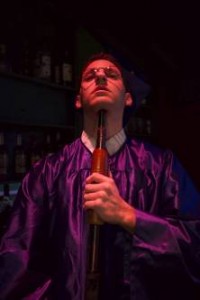
Ben as Georgie in Jesus Hates Me (Photo: Doug Catiller)
One of your biggest breaks so far has been your role in the West Coast Premiere of Wayne Lemon’s Jesus Hates Me, a part which had you speaking into an electronic voice synthesizer. How hard was that role?
From specifically a vocal standpoint, it was pretty difficult. The electrolarynx I had to speak through is meant to take the place of a larynx in a person who no longer has the use of theirs or who has had it removed completely. Seeing as how I still have the full capacity to use my larynx, it was an interesting challenge for me.
How long did it take to get you to the point that you could use it effectively?
It took me roughly two or three weeks to be able to continually use the larynx with understandable diction. I would literally walk around my house attempting to talk through it and be understood. Needless to say, this drove my family crazy. (Having a buzzing noise constantly roaming the house would drive even the most sane person to insanity.) Another problem came when we actually got into the space for performances. Although there’s a volume switch on the device, projecting to the back row of a theater is impossible when breath is the only thing coming out of your mouth. The design staff of Jesus Hates Me had to find a creative way for me to be able to be heard while making it sound like the noise was coming from me and not through the speakers of the theater. We taped a body mike to the inside collar of my shirt, and after figuring out how to limit the amount of buzz from the electrolarynx and reducing the feedback from the speakers and mike, went on with the show.
How about challenges for you as an actor having to speak without your real voice?
The major problem came from the fact that I wasn’t able to express emotion through my voice because of the monotone production from the electrolarynx. Luckily, director Oanh Nguyen was able to help me understand everything my character, Georgie, was going through, both mentally and physically. This attention to detail helped me convey emotion through my entire body and facial expression. Even if the words were, at times, not understandable, the audience could connect with Gerogie’s emotion and feelings through Oanh’s brilliant direction and my physicality.
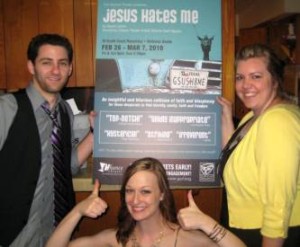
Ben, Jennifer Ruckman, and Tanae Beyer with a poster for the Jesus Hates Me run at South Coast Repertory
I called your performance “heartbreakingly funny and touching” in my review, so I’d say you succeeded! Continuing the Jesus Hates Me “saga,” not too long ago you got to reprise your role a year after the original production in a return engagement at none other than South Coast Repertory. How amazing (and unexpected) was that for you?
When I got the e-mail from Tanae Beyer, the stage manager of Jesus Hates M, in late September 2009 saying that South Coast Repertory had invited us to perform Jesus Hates Me in their Nicholas Studio at the end of February 2010, I immediately said yes. Not knowing where I’d be five months later didn’t matter because it was South Coast Rep. It was the biggest, and most unexpected, opportunity of my theater life. There was no way I was going to miss a chance like that. When I heard, a month or two later, that the entire cast and crew were also on board, that sealed the deal. When I did Jesus Hates Me at The Chance, I had the privilege of working alongside the most professional actors, managers, and directors that I have come across in my short-lived professional acting career. This was my first paying job, and it was to do something that I loved; I am forever grateful for both opportunities.
How about working in such a world-class theater environment?
Walking into the award-winning South Coast Rep every day for rehearsals and performances was incredibly humbling and completely unbelievable. When the initial astonishment wore off, the people of SCR made us feel at home. It was a privilege that I had hoped to achieve much further down the line in my career, but am so lucky to have had now. I tried to take away everything I could from the professional environment and continue to grow as an actor because of it.
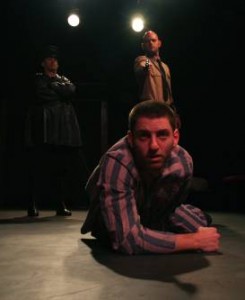
Ben in Bent (Photo: Darcy Hogan)
You recently did devastating work as a gay man in a Nazi concentration camp in Theatre Out’s production of Martin Sherman’s Bent. I’d guess that this was one of your hardest roles ever. How did it feel to dig so deep into the wells of human suffering for this role?
This play in particular hits home for me because, as a Jewish man and an avid World War II/Holocaust aficionado, I am finally able to show a story that is often not thought about, or overlooked, in American culture. The vast amounts of research that I did for this play have been accumulated over the course of my entire adult life. Along with visiting the museums in Los Angeles and learning at school about different elements of the suffering that was endured by people during the Holocaust, six or seven years ago I was lucky enough to go to the United States Holocaust Memorial Museum in Washington, DC with a group of kids from my temple. The experience was life-altering. To see, firsthand, the actual uniforms, propaganda posters, and countless other items from Europe and the concentration camps during the Holocaust left me speechless and in tears.
What impacted you most about your visit to the Holocaust Museum?
The item that had the biggest impact on me was sitting in an actual railcar that was used to transport prisoners to the camps. The experience was haunting—scratch marks on the walls of the train from prisoners attempting to hold on to the last moments of their lives, old, dried blood stains on the floor and walls of the railcar where prisoners were beaten or killed.
You must have delved back into this experience when playing Horst in Bent.
The first scene where Horst meets Max is in one of these railcars. During this scene, I was taken back to that moment in Washington, DC. The emotion behind that experience was one that fueled me every night to tell this story. Even before I stepped foot on stage, I prepared myself mentally and physically for the journey I was about to go through. I’m a creature of habit in that I did the same extensive voice and movement work thirty minutes before the house was opened, then followed that with a small centering meditation and connection. Depending upon where I was mentally that day, I focused on certain areas during the meditation: heart, head, will, or body. Finally, I listened to my iPod to relax and focus.
How politically relevant was a Bent revival in 2010 Orange County?
I think it was incredibly important for people to understand all facets of this play and the message it is conveying. People often overlook the other groups that were essentially sentenced to death by the Nazis because of the huge amount of Jews that were killed. Not that the six million people that were killed is anywhere close to the other figures, but the pure hate for someone because of their religion, race, sexual orientation, or anything like that is completely unnecessary and inhuman. Although Bent is set against the atrocities that were committed during the Holocaust, the message is still relevant today. With the United States being the melting pot that it is, especially Southern California, you would think people would learn from history’s mistakes.
How do you relate to this as a young person growing up and still living in conservative Orange County?
Having lived in Orange County my entire life, the political views in the state of California, and more specifically Orange County, on same sex marriage and the like is unheard of to me. I am a firm believer in being who you are and having the same rights as everyone else. This goes back to the incredible job my parents have done making sure that I know that I can do whatever makes me happy without hurting others. I was raised with a high moral standard and firmly believe that equality is the only solution to creating a better world. Racial, sexual, and religious discrimination is the broad spectrum for what this play is about. I’m incredibly lucky to have the opportunity to affect people with its story.
One of your Facebook profile pics was a poster which stated “You don’t have to be gay to support gay rights,” which seems entirely appropriate for a young hetero actor now appearing in Edward II, your third production at Theatre Out. What turns a straight 22-year-old into a vocal gay rights ally?
I’ve never really been interested in politics or a big political advocate in any way. I believe what I believe and others believe what they believe. I’m not going to force my opinion on you, nor do I allow anyone to force their opinion on me. That being said, equality is one of the things I feel very strongly about. When I entered Cal State Fullerton as a Theater Arts major, it came to my attention that some of the people I was having classes with or befriending were gay. Having little to no knowledge or thought about it growing up in “sheltered Orange County.” I didn’t really think twice about it.
I imagine that changed when the Prop 8 campaign started.
Although I’d never really thought about other people’s sexual orientation before, it was hard to ignore at that point. When the state of California passed the gay rights law that allowed everyone to get married, regardless of sexual orientation, I applauded. When it was repealed, I started taking a strong interest in the topic. Why would it matter to anyone else if two people that are in love want to get married? How does those two people being married affect anyone else, for good or bad? It doesn’t. The ignorance that some people display about this issue stupefies me. There is no reason for the institution of marriage to be limited to a man and a woman. Marriage is a symbol of two people’s love for one another. It’s that simple.
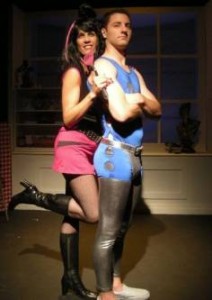
Ben in Tres Gay, his first show at Theatre Out
And now you’re doing your third production at Theatre Out, Orange County’s LGBT theater. Any thoughts about that?
When I auditioned for Theatre Out, I didn’t really see it as auditioning for a “gay theater.” I saw an audition notice for a project that piqued my interest, so I went to the audition.
I’m assuming that this has been a positive experience for you?
What keeps me coming back is the fact that David, Joey, and Jack run one of the most professional theaters in Orange County. They put up amazing works that have the audience captivated either by the message or the pure entertainment value. The messages of the productions I’ve worked on have helped influence and extend knowledge about LGBT rights.
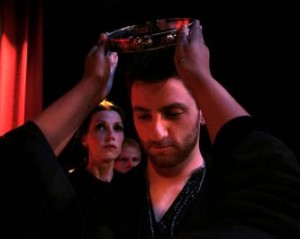
Ben as Edward II (Photo: Darcy Hogan)
You’re about to start your second week of playing title role in Christopher Marlowe’s Edward II, also at Theatre Out. What does the over four-centuries-old play have to say to contemporary audiences?
Edward II is still as relevant today as it was when Marlowe wrote it. Although the adaptation by Darcy Hogan focuses more on the love story than Marlowe’s original version because of the venue, the themes are still as prevalent today’s writings—political overthrow, true love, and the desire for power are all topics that modern playwrights explore. While the language may be a barrier for some skeptics, the love story at the heart of the play is easily understood.
Anything particularly difficult for you about doing two productions in such rapid succession?
The hardest part for me was going from Bent to Edward II, along with two 10-minute play projects I have been working on at school, in a matter of days. With that came some line memorization issues, but thankfully by tech week, they were almost nonexistent. Like I said, the language can be a barrier, but because of the clarity of the story, and having worked on numerous Shakespeare productions in the past, the 16th Century English was relatively easy. If there were words that I didn’t completely understand, I would use Shakespeare lexicons, the Internet, or ask the play’s adapter, our director Darcy Hogan, what a word a line meant. For as different as the language sounds, most of the phrasings and lines are easily translated into modern vernacular so I know exactly what I’m saying and why I am saying it.
What are your immediate career goals?
I’ll be completing my BA in Theatre Arts from Cal State Fullerton by either Fall 2010 or Spring 2011, after which I want to attend grad school and get my MFA in Acting from Yale, NYU, or a few schools in Chicago, New York, and Los Angeles.
And in the meantime?
In the meantime, I will continually be working on projects throughout Southern California, or wherever the projects take me. Although I’ve done mostly theater, I have a few student films under my belt and would love to continue in the film and television industry.
Any preference between stage and film work?
I love performing in front of an audience because of the give and take you can have with them. The audience is a character all by themselves and they influence a performance as much as the actors do. However, film and television is where I want ultimately to end up. SNL, either as a cast member or host, has always been a dream of mine, as has being on a sitcom or prime-time drama. I love entertaining while conveying a message, and certain sitcoms do that, all while having a live studio audience. Although I will always love theater and will continue to do theater for a long time, I love exploring new options.
I’m sure a multitude of them will be coming your way, Ben. Your work in Edward II is every bit as superb as what you did in Bent. I’m looking forward to following your career as it grows and blossoms!
Ben Green has been seen at Theatre Out in Tres Gay and Bent. Currently a Theatre Arts major, Radio-TV-Film minor at Cal State Fullerton, Ben was most recently seen in Jesus Hates Me at South Coast Repertory. Other recent performances include The Devil And Billy Markham, Dracula, A Midsummer Night’s Dream, Sexual Perversity In Chicago, The Glass Menagerie, Grease, Baby The Musical, And Rent. He earned the Phi Pho Pi National Championship in Dramatic Interpretation for his work on Inside Al at Santiago Canyon College.

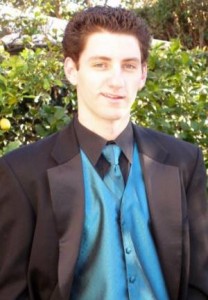

 Since 2007, Steven Stanley's StageSceneLA.com has spotlighted the best in Southern California theater via reviews, interviews, and its annual StageSceneLA Scenies.
Since 2007, Steven Stanley's StageSceneLA.com has spotlighted the best in Southern California theater via reviews, interviews, and its annual StageSceneLA Scenies.







 COPYRIGHT 2024 STEVEN STANLEY :: DESIGN BY
COPYRIGHT 2024 STEVEN STANLEY :: DESIGN BY